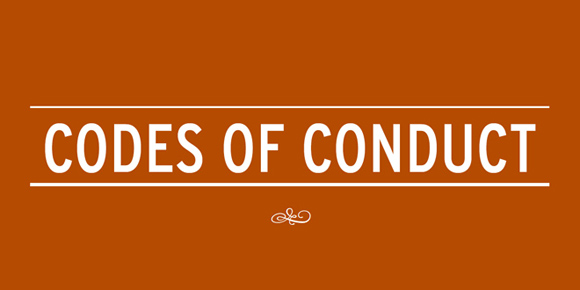Does . . . the bland, flavorless document known as the American Institute of Architects’ Code of Ethics and Professional Conduct actually capture any practicing architect’s most deeply held values or beliefs? This document is hardly noble and visionary, since it is devoted to instructing its members to obey the law. Why are architects’ Codes of Ethics like this? Is there something so wrong or dangerous with the values that actually motivate architects that they must be hidden away somewhere with their old fee schedules and accessed on the sly? How can architects begin to account for the disparity between prescriptive Codes of Ethics and what it actually feels like to be an architect and believe in what they do? How could one begin to reform architectural Codes of Ethics into something meaningful, a document with action-guiding gusto, or even more ambitiously, reform the profession’s values in general?
If instead of regarding a Code of Ethics as a sadly stale artefact of an otherwise interesting profession, we regard it with curiosity—as a potential bellwether of the profession’s internal compromises it makes to hold itself together—then we may find a starting point from which to begin exposing (and eventually, reforming) the struggles within this profession many of us love.
—Tom Spector, from “Codes of Ethics and Coercion,” abstract submitted to the Architecture and Its Ethical Dilemmas conference, 22-23 March 2004, New Hall, Cambridge, United Kingdom
May the Architect be high-minded; not arrogant, but faithful; just, and easy to deal with, without avarice; not let his mind be occupied in receiving gifts, but let him preserve his good name with dignity.
—Marcus Vitruvius Pollio, De Architectura
United Architects of the Philippines
[www.united-architects.org]
ARTICLE VII
ARCHITECTS CREDO
Section 8. Any registered and licensed architect shall recite with vigor, passion, and hope the Architect’s Credo during special or important occasion, e.g., mass oath-taking, IAPOA’s affair, PRBOA’s event. The Architect’s Credo shall be the following:
I shall work with this general objective—that my duty is not only to myself, but also to my Country and God.
I shall uphold the ideals and follow the norms of conduct of a noble profession and endlessly endeavor to further its just ends.
I shall humbly seek success not through the measure of solicited personal publicity, but by industrious application to my work, strive to merit a reputation for quality of service and for fair dealing.
I shall ask from all, fair remuneration for my services while expecting and asking no profits from any other source.
I shall hold the interest of my Client over and above any self-interest for financial returns.
I shall exercise my professional prerogatives always with impartiality and disinterestedness.
I shall avoid any private business investments or venture which may tend to influence my professional judgment to the detriment of the trust placed upon me.
I shall inspire by my behaviour the loyalty of my associates and subordinates and take upon me the mentorship of the aspirants to the profession.
I shall confine my criticisms and praises within constructive and inspirational limits and never resort to these means to further malicious motives. I shall dedicate myself to the pursuit of creative endeavor towards the goal of enlightened Art and Science, generously sharing with colleagues, friends and strangers alike the benefits of my experience and experiments.
The Society of Naval Architects & Marine Engineers
[www.sname.org]
1) The Society’s Professionals shall carry on their professional work in a spirit of fairness to employees and contractors, fidelity to clients and employers, loyalty to their country, and devotion to the high ideals of courtesy and personal honor.
2) The Society’s Professionals shall hold paramount the safety, health and welfare of the public in the performance of their professional duties. They will interest themselves in the public welfare, in behalf of which they will be ready to apply their special knowledge, skill and training for the use and benefit of mankind.
3) The Society’s Professionals shall refrain from associating themselves with, or allowing the use of their names by, any enterprise of questionable character . . . .
Architects Registration Board of the United Kingdom
[www.arb.org.uk]
As an architect you are expected to:
- Be honest and act with integrity
- Be competent
- Promote your services honestly and responsibly
- Manage your business competently
- Consider the wider impact of your work
- Carry out your work faithfully and conscientiously
- Be trustworthy and look after your clients’ money properly
- Have appropriate insurance arrangements
- Maintain the reputation of architects
- Deal with disputes or complaints appropriately
- Co-operate with regulatory requirements and investigations
- Have respect for others
Architects Accreditation Council of Australia and the Royal Australian Institute of Architects
[Excerpt; the full document may be found at www.aaca.org.au]
Professional Standard 2
An architect has a responsibility, where possible, to contribute to the quality and sustainability of the natural and built environment and the health and safety of the general public and in particular, to give proper consideration of the:
—public interest;
—natural environment whilst striving to improve the built environment and quality of life;
—conservation of the nation’s heritage; and
—conservation of natural resources.
American Society of Golf Course Architects
[Excerpt; the full document may be found at www.asgca.org.]
I. Members shall reconcile the requirements of the game of golf with the preservation and protection of our natural resources, systems and environment, balancing these elements with the economic, social and aesthetic needs of golf’s development.
II. Members shall encourage education and research and promote the development and dissemination of useful information to improve the planning, design and construction of golf courses.
III. Members shall not discriminate against any employee, applicant, client or others involved in their work on account of sex, race, age, creed or national origin.
American College of Healthcare Architects
[Excerpt; the full document may be found at www.healtharchitects.org.]
Ethical Standard 3: Members should seek ways to mentor and train younger professionals and students in order to transmit our special knowledge to those who seek to follow in our specialty.
Architects Institute of British Columbia, Canada
[Excerpt; the full document may be found at www.aibc.ca.]
Each member upon notice of registration shall make and subscribe to the following declaration:
“Solemnly do I declare that having read and understood the Act of the Architectural Institute of British Columbia, its Bylaws and Code of Conduct, and having passed the examinations, I am eligible for membership. Further do I announce that I will uphold professional aims, and the art, and the science, of architecture and thereby improve the environment. I also accept with obligation the need to further my education as an architect. I promise now that my professional conduct as it concerns the community, my work, and my fellow architects will be governed by the ethics and the tradition of this honourable and learned profession.”
Originally published late 2012, in arcCA 12.1, “On Good Behavior.”






